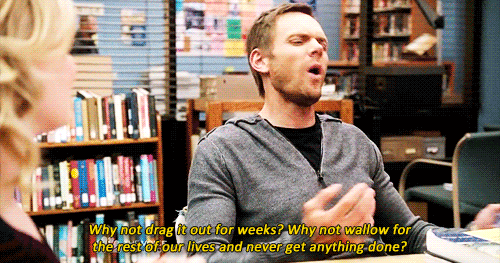Well my friends, it's that time of the year. Picture Lock season. Each and everyone of us has worked hard, suffered greatly, and felt like we've gotten nothing accomplished. But as we near the end of our filmmaking journey, I want to reflect on the steps we've taken (or at least I've taken) to get to this point.
5 Phases of Making a Fiction Field Production I Film
1. Pick Your Group
Though this seems like an easy task, the cooperation of your team members can either make or break your film and/or mental state. A group that works well together and has members with different strengths makes the difficult process of making a film a little bit easier. They become your family. Either you love them or you hate them, but you're attached to them no matter what. Thankfully, I got lucky and have a really strong group with some great people, and they have become not only my coworkers, but my friends.
2. Pre-Production
You're all so excited. "We're going to make a movie!" You assign jobs, then start planning how the rest of the semester is going to go. You have to write the script, find sponsors, start a fundraising campaign, get actors, get additional crew members, get locations, storyboard, start production design, the list goes on... forever. But you're bright-eyed and bushy tailed, ready to take on this film and make your family proud. So how do you get started? You don't... for weeks. Because you think you have time. You have all semester! Why bother?
Don't worry, it'll all get done. Right?
3. Beginning Production
Nope. You were wrong. You were so, so wrong. By now you've wasted at least three weeks, spring break has come and gone and you haven't even casted. The script may or may not be done (sorry guys, my bad), and you have to start filming in a week. As of right now, your blood pressure is shot through the roof. You have to distribute flyers and still make a blog post. Coffee is your new best friend. But you get together with your group and you muddle through it, dealing with one crisis after another to start on time. You are now familiar with panic attacks, but feel like you have gained superhuman powers at the same time. This is what adulthood feels like, and although you're unsure of the future, you go into the next phase head on.
4. Production
You're in the heart of your production phase. Check your pulse. Yes, you're still alive, but barely. You haven't slept in what feels like years. Your friends and family are worried because they haven't heard from you and don't know where you are. You forget that you have other classes, and your grades suffer from it. Coffee is not your friend, but has become a part of your bloodstream.
Schedules are no longer set in stone. Film shoots are temperamental, either convincing you that you will be the next Steven Spielberg or making you rethink your entire career and future. Arturo laughs as your health deteriorates, slowly but surely. Someone, if not every single person in your group has had some sort of a mental breakdown. But post production is so close, so you torture yourself a little bit longer, hoping and praying that something, ANYTHING good will come of this hell known as filmmaking.
5. Post-Production
You think you'd be relieved, but the work has really just begun. This is the part where you save your film from every little and big mistake that you've made during pre-production and production. And it all falls on the one or two people you call your editors. Thankfully, this is not me, but I have a feeling my work is not done. As we approach this stage of our voyage, I can only hope that it's smooth sailing. But like all of my hopes and dreams this semester, I'm fully aware that this will not be the case. Until then, I'll live my life day by day and hopefully come out of this with at least one lesson: Making films is hard. If anyone ever says anything different, this semester has shown me that it is completely appropriate to react with physical violence.

So to everyone in my class, and all future Fiction Field members, I wish you luck as we come to the close of the longest (yet shortest) semester of my life, and I look forward to all of our hard work to translate into something we're not embarrassed to show even our parents.
(Bonus) Wrap Party

















